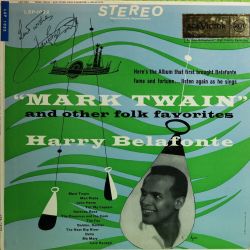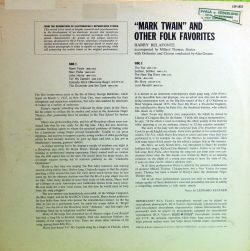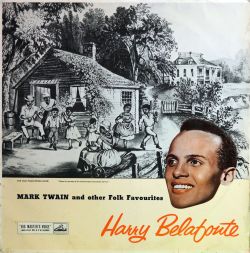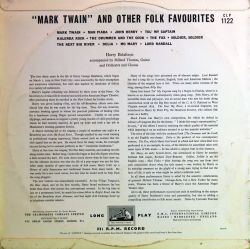|
|
|

 |
LP mono RCA LPM1022
LP pseudostereo RCA LSP1022
LP Victor Japan HP5049
LP HMV UK
CLP1122 (see below)
LP RCA Australia L10021
All songs are also on
the album BCD16262
and on the CD box RGMCD006
EP: EPB-1022 |
Released in 1954
Accompanied by Millard Thomas (guitar)
Orchestra and Chorus Supervised by Hugo Winterhalter
Session Producers : H. Winterhalter,
Henri René,
Jack Lewis and Joe Carlton.
Recorded in RCA Victor's Manhattan Center and
24th Street Studios, Apr. 9, 22 & 29 and May 13, 1954
Cover Art: Kysar
Liner-notes: Leonard Feather |
|
|
| A1 |
Mark Twain # |
3:42 |
 |
| A2 |
Man Piaba # |
3:30 |
 |
| A3 |
John Henry # |
3:27 |
 |
| A4 |
Tol' My Captain # |
2:45 |
 |
| A5 |
Kalenda Rock
(Mourning Song) |
3:22 |
 |
| A6 |
The Drummer And The Cook # |
2:04 |
 |
| B1 |
The Fox # |
2:43 |
 |
| B2 |
Soldier, Soldier # |
1:37 |
 |
| B3 |
The Next Big River # |
0:20 |
 |
| B4 |
Delia # |
2:58 |
 |
| B5 |
Mo Mary # |
2:15 |
 |
| B6 |
Lord Randall # |
4:07 |
 |
|
Harry Belafonte's first album features a solid variety of
songs from American folk tradition, learned during his studies of folk music
at the Library of Congress in the early 1950s. He had signed with RCA Victor
in 1952, recording a series of well-received singles. Belafonte's new-found
love for music of the West Indies can be found in songs such as "Man Piaba"
(which he wrote) along with songs from English and Scottish tradition such
as "Lord Randall" and "The Drummer & the Cook." Songs from African-American
tradition include the chain gang song "Tol' My Captain" and the ubiquitous
"John Henry."
Mark Twain was a good initial effort, but Belafonte's repertoire and
delivery would get stronger with the next album.
~ Cary Ginell, All Music
Guide |

HMV CLP-1122 (UK) front |

HMV CLP-1122 (UK) rear |
|



